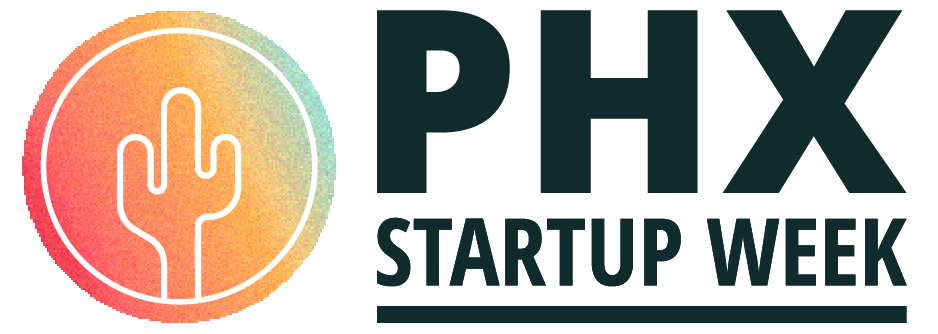PHX Startup Week 2019 planning began with a very specific intention — build an event representative of the diversity of the PHX Entrepreneurship Ecosystem, inclusive of all people, industries, and stage of business.
This charge was given to every single one of the teams who came together to build the event, but as the programming team, we knew an event that claimed diversity and inclusion would fall flat if our speaker line-up didn’t reflect that goal.
As a programming team we are proud to say, mission accomplished!
We set out to have an inclusive event with speakers that are age diverse (both at heart as well as in age), ethnicity diverse, and gender diverse. Most notably, while the national average for speakers at conferences is a ratio of 2-to-1 male to female, PHX SUW 2019 has 46%, female-identifying speakers and panelists.
Our daily track has representation from tech startups as well as non-tech startups. We dove into functional areas of marketing, branding, design, development, operations, founder, growth, sales and legal. Did we succeed? Oh hell yes we did!
But it certainly wasn’t an accident.
So how do you start tackling a community event that’s focused on diversity?
We started by developing Core Principles to integrate throughout the event. Huge props to Abby Rudd and Tari Thomas for all their hard work fleshing out the Core Principles and clearly defining them for the programming team.
Core Principles:
- Diversity
- Transformational Leadership
- Collaborative Problem-Solving
- Grit — Failing Forward
- Customer Obsession
- Future is Now
- Navigating Technological Change
- Culture Embedded in Business
After identifying the functional areas we outlined industries for speakers:
- Tech
- Non-tech
- Social Entrepreneurship
- International
Over time, expectations from prior years of Startup Week, sponsor desires and commonality of speakers, we started grouping people into various “vertical” tracks.
While there is benefit from learning high-level concepts at a conference, the struggle for many entrepreneurs is finding the time to distill that information down into action items that they can take and move their business forward. I wanted to incorporate an idea I’d seen Nikki Nixon incorporate into the Flip My Funnel conference, to deliver actionable takeaways from every session. That central goal became a question to ask ourselves, “does each and every session of 2019 Phx Startup Week deliver actionable takeaways that entrepreneurs can take steps TODAY to move their business forward?”
We certainly hope so!
We were going to start small and “test” an idea to have workshop-style sessions this year and only have one workshop a day. Then the submissions came rolling in, and content around branding, fundraising, sales, gaining PR exposure, leadership, metrics and so on and soon we had two workshops scheduled for each day.
We planned to cut down on the total number of sessions each day, focusing on quality over quantity of speakers. Then, as the deadline for speaker applications came and went, it became apparent that we had too many quality speakers, passionate about sharing their experience with fellow entrepreneurs, we decided to add more sessions to the lineup to accommodate, and still had difficult choices to make.
We started with 14 sessions a day, 4 for a technical track, 4 for a non-technical track, 4 for functional content and then a keynote and panel, resulting in 70 sessions for a 5-day conference. The ~200 submissions we received from amazing people throughout the Valley made it apparent that we needed to adjust (heck, isn’t that what entrepreneurs do all the time anyway?)
We now have 22 sessions each day, for a total of 132 total sessions (that’s after we expanded to add on Saturday as well). Every day there is a technical track, a non-technical track, two functional content tracks, two introductory 101 style sessions, two workshops, and two keynote/panel sessions. Adding all the people that are co-presenting, on panels, and sponsored content, we’ve got over 150 amazing people donating their time to help you learn and grow yourself and your business.
Speaker Selection
A common question, especially for anyone that didn’t get selected to speak, is how did we choose speakers? I’ll tell you how we did it, though we already have learned and heard from other people’s ideas that might make this better next time around.
If you haven’t seen it mentioned before, the entire group of people that put together PhxStartupWeek is completely volunteer-based. This shows that there are a bunch of people interested in and invested in the success of the entrepreneurial ecosystem here in Phoenix. One of the challenges is that the group may not have in-depth knowledge of each industry or have deep connections into well established, large businesses. We have to rely on people stepping forward to say that they want to speak, whatever connections and knowledge our group already has, as well as what information we can gather from individuals to select a bunch of people to speak.
Our programming team started with quite a few hard-working ASU students. They are a great group of people, though as most of us who are young in our careers, don’t necessarily have a wide, diverse network. Additionally, while a few of us had seen a large variety of Phoenix-based people speak previously, the majority of our team hadn’t experienced presentations by some of the larger than life personalities here in the valley.
We decided to borrow the format used last year and have speaker applicants submit a video. Some people who wanted to speak HATED this idea, believe me, we’ve got the emails to prove it. We understand that speaking straight into a camera on your own is very different than getting up in front of an audience and delivering great content with presence. At the time, we thought this method would be most fair as well as get the highest quality speakers that we could. While we have some suggestions for next year’s team, if you have ideas, we’re open to hearing them!
As the submissions came in and we started sorting them, each person on the team chose a primary topic or two they were passionate about helping lead. We then had two other people join into reviewing submissions from that topical area. Using a rubric to grade each submission by the speaker’s presence, the uniqueness of topic, subject knowledge, credibility, and their alignment to the theme. Each area would get scored from 1–5 by three different people with that score totaled.
We averaged all three scores and then reviewed the content to ensure we didn’t have four different speakers from one particular track all talking about the same thing. Additionally, we dove into each area and identified hot topics in the industry that we were hoping would have coverage to give the most current value to attendees. Based on all these factors, we picked out those with the highest average score to be this year’s speakers!
One last item on diversity here. We were very conscious about making sure we had representation from speakers of all backgrounds. Once we got to this list of the submissions from each category that had the highest scores, I did go through and take a high-level view of each topical area to see if we had diverse representation. I was hoping to not “force” diversity into the program and that it would happen naturally.
While there were one or two areas that we pulled up an additional speaker to ensure we didn’t have “a bunch of white guys” for an entire track speaking all day, I’m excited to say that we achieved this diverse line-up that included the 46% representation of women — naturally! Averaging scores from a rubric of items, considering hot topics in the industry and trying not to double up on speaking topics, we found that expertise in our ecosystem is found in a variety of ethnic and cultural backgrounds and excited to showcase that next week!
For all of you who like data… 200 submission videos, each approximately two minutes long, each reviewed by three people (sometimes more than once, but let’s say one time through for now), means the team reviewed over 20 hours of submission videos to identify speakers for this year’s event.
We really hope you enjoy the event and get a TON of value out of it! We hope each presenter delivers takeaways that help you move forward personally and professionally immediately. We put a lot of time and care into building an event that would allow you time to network with others (since we know and have survey data showing that people really enjoy that aspect of the event) while diving into a plethora of topics and ideas that help you learn new things and perhaps think of things differently.
Whether you love it or hate it, I’ll be at the event all week long, feel free to come by and share how you think things could work better next year. I know there are things we could’ve done better and happy to look for opportunities to incorporate insights from others.
Thank you and I hope to see you at Startup Week!

